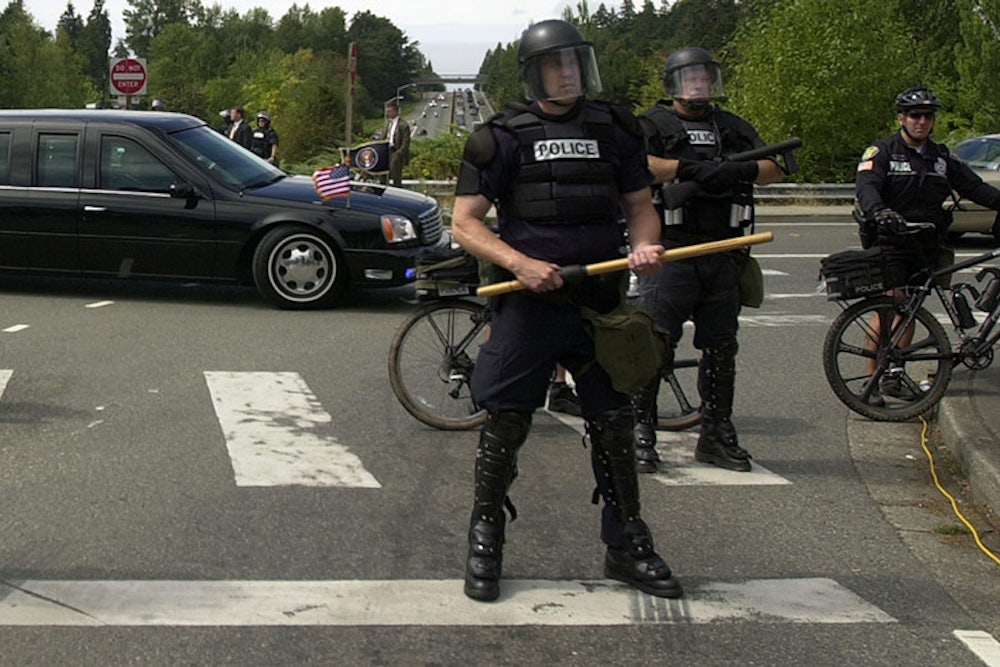The Supreme Court’s end-of-term opinion cascade is now underway, and one of yesterday’s five decisions deserves a bit more attention than it is so far getting. In Wood v. Moss, the Court handed the Secret Service a unanimous victory against protesters herded away from the President’s motorcade route, who alleged, as Justice Ginsburg explained, that “in directing their displacement, the agents acted not to ensure the President’s safety, but to insulate the President from their message.” On the theory of half a loaf being better than none, I thought I’d highlight that—notwithstanding its outcome—the opinion provides a little bit of ammunition to those who oppose the Orwellian “free speech zones” that corral protesters in areas out of sight and earshot of their intended audience.
The case arose out of a 2004 incident in Jacksonville, Oregon. President Bush was on the campaign trail. Protesters assembled on one side of the street his motorcade was travelling; supporters on the other. So far, nobody had much access to the President, but whatever access they had was the same for both sides. But then Bush decided to stop for an unplanned dinner, eating on the patio of a local inn. The Secret Service decided to allow the supporters to remain where they were, about half a block away, but instructed local police to move the protesters to a more distant location, a couple of blocks east. From their new location, the protesters were “beyond the President’s sight and hearing.”
The protesters sued for damages, alleging that the Secret Service agents discriminated against their anti-Bush viewpoint. After quite a bit of back-and-forth, the Ninth Circuit Court of Appeals rejected the government’s argument that the case should be dismissed, instead allowing it to proceed towards trial. Judge Marsha Berzon wrote, “The anti-Bush protestors claim that the Secret Service agents sought to suppress political speech undertaken on a public street based on the viewpoint of that speech. This claim strikes at the core of the First Amendment.”
The Supreme Court disagreed, pointing out that the location of the Bush protestors—but not the Bush supporters—prior to the challenged move put them within sight and weapons reach of the al fresco President. Making a number of references to the “overwhelming importance” of the president’s safety, Ginsburg examined the options available to the Secret Service, and found none more satisfactory than what it chose. She was underwhelmed by the suggestion that the agents could have urged the president not to eat at the inn. And she points out that insisting that the pro-Bushies also be moved farther away would have suppressed their speech more than security required. And so the Secret Service agents win; the case is dismissed.
But victory this time does not mean victory every time. The Wood opinion makes a few cautious gambits in the direction of free speech. First, without making it a holding, the opinion suggests that the First Amendment forbids police to prefer one group of speakers to another based not on an “objectively reasonable security rationale” but rather “solely to inhibit the expression of disfavored views.” More important, the Court intimates as well its disapproval of the Bush White House “manual” instructing White House advance teams to “work with the Secret Service and have them ask the local police department to designate a protest area where demonstrators can be placed; preferably not in view of the event site or motorcade route.” This manual, Justice Ginsburg explains, is not damning in this case because it “guides the conduct of the President’s political advance team,” who were not defendants. She emphasizes that the Secret Service has its own written policies that “prohibit Secret Service agents from discriminating between anti-government and pro-government demonstrators.”
The point is, law enforcement—even the president’s Secret Service detail, much less local police—should be even-handed in their treatment of pro- and anti-establishment speakers. The protesters lost in Woods because the Court was unpersuaded that the Secret Service had strayed from that requirement, not because it questioned the requirement itself.
